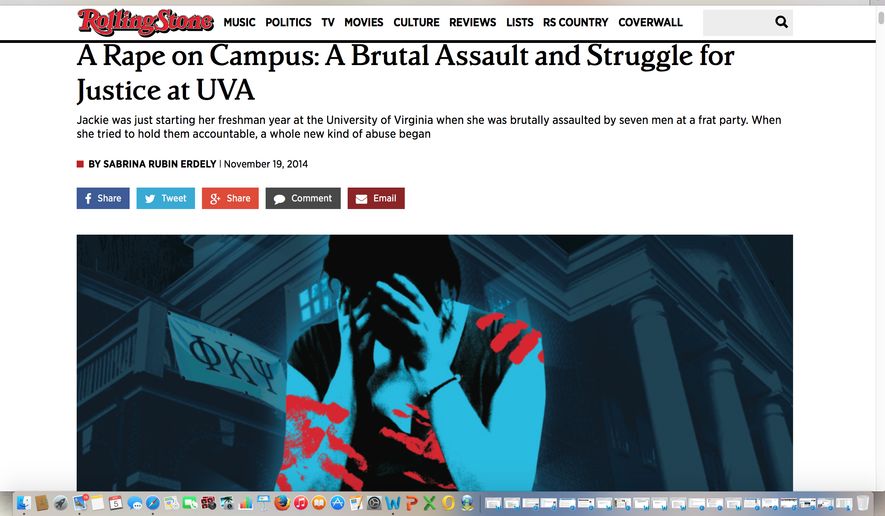There will be no repercussions for the investigative reporter or editors responsible for a now-retracted Rolling Stone cover story in November that falsely accused Phi Kappa Psi fraternity members at the University of Virginia of gang-raping a freshman coed.
In a stinging report released Sunday evening, an independent review by the Columbia University Graduate School of Journalism said the magazine was reckless in vetting its sources, including the purported victim, identified only as “Jackie,” and neglected “basic, even routine journalistic practice.”
“If Jackie was attacked and, if so, by whom, cannot be established definitively from the evidence available,” the review stated, adding that there needed to be a better balance between “sensitivity to victims and the demands of verification.”
The 12,866-word report, released Sunday night after more than three months of comprehensive research, said the story’s author, Rolling Stone contributing editor Sabrina Rubin Erdely, could have avoided catastrophe had she contacted other sources for fair comment.
“The editors invested Rolling Stone’s reputation in a single source,” the report said.
In a statement posted on the website, Rolling Stone Managing Editor Will Dana said the magazine was “officially retracting” the story.
He also said the publication was “committing ourselves to a series of recommendations about journalistic practices that are spelled out in the report. We would like to apologize to our readers and to all of those who were damaged by our story and the ensuing fallout, including members of the Phi Kappa Psi fraternity and UVA administrators and students.”
However, he spelled out no consequences for any staff members involved.
Rolling Stone publisher Jann S. Wenner told The New York Times on Sunday night that “Jackie” was “a really expert fabulist storyteller” who manipulated the magazine’s editorial process. He said he was not trying to move blame from the magazine to the source but added that “obviously there is something here that is untruthful, and something sits at her doorstep.”
Ms. Erdely also issued a written apology in which she described reading the Columbia Journalism Review report as a “brutal and humbling experience.”
“Reporting on rape has unique challenges, but the journalist still has the responsibility to get it right. I hope that my mistakes in reporting this story do not silence the voices of victims that need to be heard.”
Conservatives responded to the Rolling Stone story early on with deep suspicion, and even in light of Ms. Erdely’s apology, they were unforgiving.
“Perhaps Ms. Erdely will get the Pulitzer Prize for best fiction that she so richly deserves,” one commenter wrote on the Wall Street Journal site. One commenter on Reason asked, “Where do the UVA fraternity members go to get their reputations back?”
In March, the Phi Kappa Psi chapter said it was considering its legal options to deal with the “extensive damage caused by Rolling Stone.”
The Columbia Journalism Review released its report two weeks after Charlottesville Police Chief Timothy Longo said investigators were “not able to conclude, to any substantive degree, that an incident that is consistent with the facts contained in that article occurred at the Phi Kappa Psi fraternity house or any other fraternity house.”
In a press conference last month, Chief Longo also said the purported rape victim had made previous, unverified reports of being attacked in the college town by other men and declined to provide a statement to detectives.
Her account of being gang-raped at the Phi Kappa Psi fraternity house in 2012 was the substantive basis of the magazine’s cover story.
The Rolling Stone article, “A Rape on Campus,” provided graphic details about a brutal attack by seven fraternity members. It sparked outrage at U.Va. and across the nation as evidence of a “rape culture” on university campuses resulting from predatory fraternities and apathetic school officials.
Almost immediately after the story was published, the university temporarily suspended all of its fraternities, including Phi Kappa Psi, whose house was later vandalized and whose members received anonymous death threats.
But within days after the story was published in November, the magazine issued an online apology after follow-up reporting by Slate, The Washington Post and other media outlets could not corroborate details of Jackie’s story. It also was learned that Ms. Erdely did not contact the accused men for fair comment.
Three of Jackie’s friends publicly denied Rolling Stone’s account of how they discouraged the purported victim from reporting the assault, and her date from the night in question, a U.Va. student who she said lured her to an upstairs room in the fraternity house to be raped could not be found.
“In the face of new information, there now appear to be discrepancies in Jackie’s account,” Mr. Dana said in a Dec. 5 online statement.
The magazine has since removed the story from its website.
The Washington Times reported in December that the three phone numbers Jackie told her friends belonged to the man who raped her were actually fake Internet numbers generated by a service that helps people veil their identities.
Three days later, Ryan Duffin, the man Jackie first turned to about her gang rape and presumedly had a crush on, told the Daily Caller that it was “a definite possibility” that she had fabricated the rape claim to get his attention.
One of the more telling emails that Mr. Duffin received in October 2012, written by Jackie, turned out to be plagiarized from a 1998 script for the TV teen drama “Dawson’s Creek.”
“When you like someone more than he likes you, you’ll do anything to switch the scales,” she reportedly wrote.
• Jeffrey Scott Shapiro can be reached at jshapiro@washingtontimes.com.




Please read our comment policy before commenting.